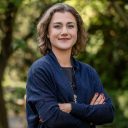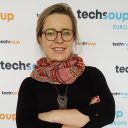‘How to use technology to make social projects more impactful?’ was an overarching theme of the 2017 European Foundation Centre’s (EFC) annual conference session called ‘Technology for social good (and bad)’. During this second day session, participants had a chance to learn about solutions, tools and trends in humanitarian aid, social inclusion, transparency and governance and citizen engagement; as well as practical work with data.
The session was led by Anna Sienicka, Europe Vice president of TechSoup and Kuba Wygnański, CEO of the Unit for Social Innovation and ‘Shipyard’ Research. It aim was to involve participants to practically test, learn from and evaluate the new ways of tackling old problems through technology and innovation.
‘How to use technology to make social projects more impactful?’ was an overarching theme of the session. Participants had a chance to learn about solutions, tools and trends in humanitarian aid, social inclusion, transparency and governance and citizen engagement; as well as practical work with data.
The session was organised in a tailored and adjusted format of slow ‘speed-geeking’. There were four thematic stands and each participant could participate in three 20-minute presentations on a specific project or solution:
Civic engagement and transparency
Luna Kalas of FTS and Sandor Lederer of K-Monitor talked about the community projects from the central and eastern Europe region. Experts showed how technology can help to trace down corruption using a ‘red flag’ project, indicating the likelihood of corruption in public procurement, and even assess individual’s tendency of corruption, the ‘C-test’.
They also presented means to trace down connections between different entities and people involved in their governance (‘The net of connections’ project). It was a fascinating example of how technology can be tailored to the needs of particular clients and/or addressees.
Humanitarian aid, refugee response and technology
Dimitris Kokkinakis of Impact Hub Athens presented how their organisation managed to involve technology-savvy refugees not only to improve life in refugee camps, but also on their way to a better life.
Thanks to Impact Hub Hack, the Camp Athens participants came up with solutions improving their living standards and facilitating access to labour market. They empowered people in transit by making them ambassadors of change! Dimitris strongly believes in enhancing individual’s ability through skills and independence, by the ability to make money.
Digital Inclusion
In the room there was also Vesna Bajsanski-Agic of Mozaik Foundation. She introduced the concept of the ‘invisible line of impact, which is used for their social entrepreneurs and community project.
The goal of the project is to create a community of program alumni who – as successful social entrepreneurs – might become role models for young people in Bosnia and Herzgovina in the next 10 years. Mozaik Foundation dares to make a non-measurable project outcome a promise. According to Vesna that greatly increases the chances to realize project objectives.
Data
The last of the stops on the room journey explored the role of data in philanthropy. It was led by Jon Toomer and Paul van Haver from TechSoup Validated Services.
The data corner used the ‘spectrum game’ to get participants debating questions about data and grantmaking which led to some interesting insights and arguments about what kind of data and how much data foundations need, whether or not the European Foundation sector might synchronize data at some point, the nature of qualitative vs quantitative data in grantmaking and security.
by Anna Kwiatkiewicz-Mory, Director of Institutional Development, TechSoup Europe
Katarzyna Zwolak-Szwechowicz, Content and Communication Specialist, TechSoup Europe
Click here for more coverage from the 2017 EFC annual conference.






Comments (0)